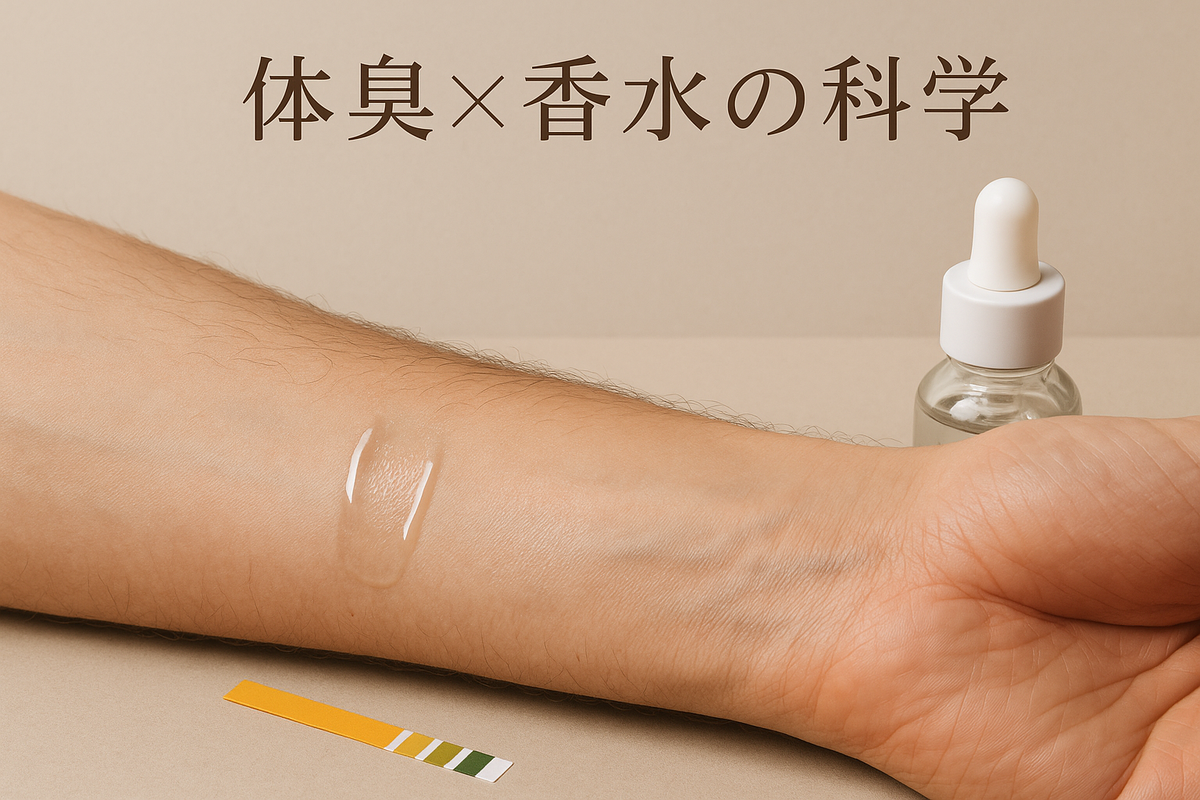The relationship between perfume and body odor: How to find the scent that suits you
The relationship between perfume and body odor: How to find the scent that suits you
Have you ever had the experience of thinking, "This perfume smelled good in the store, but it smelled different when I put it on..."? In fact, the way perfume smells can change greatly depending on an individual's body odor and skin type.
In this article, we'll explain the science behind the relationship between body odor and perfume, and show you how to find the scent that's best for you. Here are some tips to help you find your own special scent.
table of contents
- Body odor and perfume interactions
- Factors that cause individual differences
- Changes in scent depending on skin type
- Recommended perfumes for different body odor types
- How to find the right perfume for you
- Tips on how to try and choose perfume
- Summary: Find your unique scent
Body odor and perfume interactions
The mechanism by which scent changes
Here are some reasons why perfume smells different on different people:
-
Mixed with sebum
- Sebum components react chemically with fragrances
- Differences in individual sebum composition
-
The effect of skin pH
- Changes in fragrances due to acidity or alkalinity
- Differences in skin acidity due to individual differences
-
Evaporation patterns due to body temperature
- The rate at which scents diffuse depending on body temperature
- Fragrance strength depending on blood circulation
-
Harmonizes with natural body odor
- Individual body odor components
- The impact of hormone balance
Scientific Background
Changes in fragrance molecules
- Skin enzymes break down fragrance molecules
- Deterioration of fragrance due to oxidation of sebum
- Generation of new fragrance components through interaction with sweat
Personal olfactory characteristics
- Individual differences in olfactory receptors
- Changes in sensitivity due to familiarity
- Genetic differences in olfactory characteristics
Factors that cause individual differences
Physiological factors
-
Hormonal balance
- Changes in body odor due to sex hormones
- The effects of stress hormones
- Changes in scent due to the menstrual cycle (women)
-
Metabolic differences
- Differences in body temperature due to basal metabolic rate
- Sweat volume and sweat components
- Individual differences in sebum secretion
-
Genetic factors
- Genes that determine body odor components
- Sensitivity to scents
- Metabolic enzyme activity
Environmental factors
The impact of diet
- Spicy foods affect body odor
- The effect of alcohol on aroma
- Differences in body odor between vegetarians and meat eaters
Lifestyle
- Sweating patterns based on exercise habits
- Changes in body odor due to stress levels
- The effects of lack of sleep on metabolism
Products used
- Compatible with body soap and shampoo
- Mixing with antiperspirants and deodorants
- Interactions with cosmetics and skin care products
Changes in scent depending on skin type
dry skin
Features
- Less sebum secretion
- The scent doesn't stick to the skin easily
- The scent lasts for a short time
Fragrance trends
- The top notes tend to be strong
- Middle and base notes tend to be weak
- Overall dry impression
Recommended perfume types
- Eau de Parfum : Highly concentrated and long-lasting
- Cream perfume : moisturizing and fragrant
- Oil-based perfumes : They blend easily with the skin and last a long time
Oily skin
Features
- Excessive sebum secretion
- The scent tends to be strong
- The scent changes greatly
Fragrance trends
- The overall scent is strong
- Mixed with sebum for a heavy impression
- Significant changes over time
Recommended perfume types
- Eau de toilette : Light and easy to adjust
- Citrus : Refreshing and reduces oiliness
- Aromatic : Natural scent that blends easily
combination skin
Features
- Different skin types depending on the area
- The fragrance tends to come out unevenly
- Large seasonal changes
countermeasure
- Use different locations to attach the item
- Change your perfume according to the season
- Use in small amounts and observe the results
Recommended perfumes for different body odor types
Sweet body odor type
Features
- Naturally sweet scent
- More common among women
- Goes well with vanilla and fruit flavours
Recommended perfumes
- Floral : Make the most of natural sweetness
- Fruity : Enhances sweetness
- Vanilla-Amber : Creates a deep sweetness
Fragrances to avoid
- Excessively sweet scent (can be cloying)
- Extremely spicy aroma
Spicy body odor type
Features
- Naturally spicy
- More common among men
- Harmonizes with woody and spicy scents
Recommended perfumes
- Woody : For a natural masculinity
- Spicy : A distinctive and memorable fragrance
- Oriental : Expressing depth and complexity
Fragrances to avoid
- Overly sweet floral
- Very light citrus
Neutral body odor type
Features
- Less characteristic body odor
- The original scent of the perfume comes out easily
- Compatible with many fragrances
Recommended perfumes
- Any type is OK : Few restrictions
- Personalized Scent : Express Your Identity
- Seasonal scents : choose according to the occasion
How to find the right perfume for you
Step 1: Know your body odor
-
Objective verification
- Ask someone you can trust
- Check the smell of sweat after exercise
- Check the smell of your everyday clothes
-
Understanding skin type
- Checking sebum secretion
- Check for dry skin
- Observing seasonal changes
Step 2: Lineage testing
How we tested
- Try one at a time ; avoid multiple at the same time
- Take your time : Observe for at least 2-3 hours
- Over multiple days : Check for changes due to physical condition
Fragrance types to test
- Citrus
- Floral
- Woody
- Oriental
Step 3: Detailed analysis
-
Recording changes in scent
- Impression immediately after application
- Changes after 30 minutes, 2 hours, and 4 hours
- Reactions of people around
-
Identify compatible strains
- Naturally scented
- A scent that lasts for a long time
- A fragrance that lets you express yourself
Tips on how to try and choose perfume
How to try it in store
-
preparation
- Come to the store without wearing perfume
- Avoid products with strong fragrances.
- Choose a day when you feel good
-
Steps to try
- A small amount on the inside of the wrist
- Don't sniff it right away, wait 5-10 minutes
- Check the change in scent over time
-
Record and Compare
- Record the name of your favorite scent
- Check the price and capacity
- Narrow down your search from multiple candidates
Using samples
merit
- You can try it at home
- Check the change in scent in daily life
- You can see the reactions of those around you
How to use
- Try at a different time of day
- Try on different outfits
- Check the changes in different activities
Check points before purchasing
-
Multiple Tests
- Try at least three times on different days
- Checking reactions under different physical conditions
-
Considering the season
- Difference between time of purchase and time of use
- Prediction of changes due to temperature and humidity
-
Clarification of use
- For everyday use or special occasions?
- For business or personal use
The harmony of Ranjatai Eau de Parfum and body odor
Our Ranjatai Eau de Parfum is enjoyed by many types of body odor:
Features
- Perfumed with natural fragrances : a natural blend with your skin
- Japanese incense wood base : Suitable for Japanese skin types
- Moderate concentration design : Perfect balance between not too strong and not too weak
Compatibility by body odor type
- Sweet body odor : The depth of the fragrant wood enhances the sweetness
- Spicy body odor : Naturally blended with woody notes
- Neutral body odor : Enjoy the complex scent of perfume
Learn more about Ranjatai Eau de Parfum
Summary: Find your unique scent
Tips for finding the right perfume for you:
Critical Step
-
self analysis
- Identifying the type of body odor
- Understanding skin type
- Lifestyle considerations
-
Systematic testing
- Trial by scent type
- Observing changes over time
- Multiple test runs
-
Overall Judgment
- Fragrance compatibility
- Suitability for Use
- Possibility of long-term use
Things to keep in mind
Choosing a perfume starts with knowing yourself. Your body odor is a part of your personality, and choosing a scent that takes advantage of that will create an attractive scent that is unique to you.
Take your time and try out different scents to find the special one that really suits you. That scent will surely bring out the best in you.
Related articles
- What is a perfume family? A detailed explanation of the characteristics of each fragrance type
- Perfume and Allergies - A Guide for People with Sensitive Skin





![[Sengoku Fragrance] Ranjatai Eau de Parfum 50ml](http://cavto.jp/cdn/shop/files/MG_1544_e13ac5a9-8c72-4da5-8c41-ac687194c31d_300x300.jpg?v=1744864411)